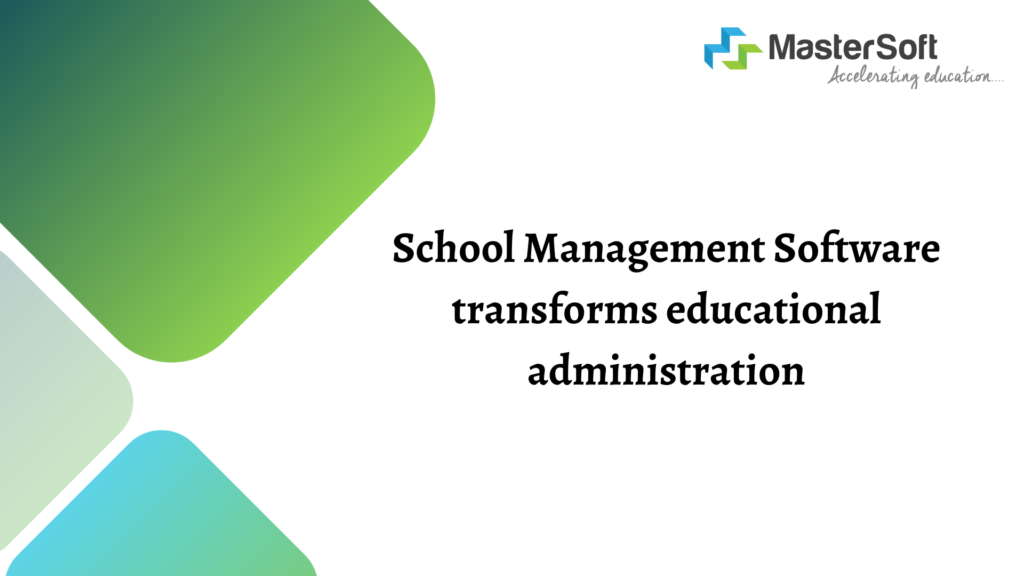In today’s fast-paced educational landscape, schools face numerous challenges ranging from administrative burdens to the need for effective communication and data management. To address these challenges, many educational institutions are turning to School Management Software (SMS). This technology streamlines operations, enhances communication, and improves overall efficiency, ultimately contributing to better educational outcomes. In this blog, we will explore what school management software is, its key features, benefits, and how it transforms the educational experience for students, teachers, and administrators alike.
What is School Management Software?
School Management Software is an integrated solution designed to facilitate various administrative and academic processes in educational institutions. It encompasses a wide range of functions, including student enrollment, attendance tracking, grading, communication, and financial management. By automating and centralizing these tasks, SMS minimizes the reliance on manual processes, reduces errors, and enhances productivity.
Key Features of School Management Software
School management software typically includes a variety of features that cater to the diverse needs of educational institutions. Here are some of the most common and essential features:
1. Student Information Management
SMS allows schools to maintain comprehensive student profiles, including personal information, academic history, and attendance records. This centralized database ensures that administrators and teachers can access vital information quickly and efficiently.
2. Enrollment and Admissions Management
With SMS, schools can streamline the enrollment process by automating application submissions, document verification, and acceptance notifications. This feature simplifies the admission journey for both prospective students and administrative staff.
3. Attendance Tracking
School management software enables teachers to record and monitor student attendance easily. Automated attendance tracking minimizes errors and provides real-time insights into student participation, allowing educators to identify trends and address issues promptly.
4. Grading and Assessment Management
SMS offers tools for grade management, enabling teachers to input, calculate, and report student grades efficiently. This feature often includes grade books, report cards, and performance analytics, allowing educators to provide timely feedback to students and parents.
5. Communication Tools
Effective communication is crucial in education, and SMS provides various communication tools for administrators, teachers, students, and parents. Features such as messaging, announcements, and notifications keep all stakeholders informed and engaged in the learning process.
6. Timetable and Scheduling
School management software helps schools create and manage class schedules, room assignments, and teacher rosters. This feature ensures that the allocation of resources is efficient and that students receive a well-structured timetable.
7. Financial Management
Many SMS platforms include financial management tools that help schools handle tuition fees, billing, and budgeting. These features facilitate transparency in financial transactions and improve overall financial planning.
8. Reporting and Analytics
SMS generates detailed reports on various aspects of school operations, from student performance to attendance trends. These analytics empower administrators and educators to make data-driven decisions that enhance academic outcomes and operational efficiency.
Benefits of School Management Software
The implementation of school management software offers numerous benefits for educational institutions, including:
1. Increased Efficiency
By automating administrative tasks, SMS reduces the time and effort required for manual processes. This increased efficiency allows educators and administrators to focus on more strategic initiatives that enhance student learning.
2. Improved Communication
SMS fosters better communication among all stakeholders. Parents can stay informed about their child’s progress, teachers can easily share information with colleagues, and administrators can communicate important announcements effectively.
3. Enhanced Data Management
Centralized data management simplifies record-keeping and reporting. Schools can easily access and analyze data, leading to improved decision-making and the ability to identify areas for improvement.
4. Better Student Engagement
With tools for monitoring attendance, performance, and communication, SMS allows educators to engage more effectively with students. This engagement can lead to improved academic performance and a more positive school experience.
5. Customizable and Scalable Solutions
Many school management software solutions are customizable to meet the specific needs of different educational institutions. Additionally, as schools grow, SMS can scale to accommodate new students, teachers, and programs without significant additional resources.
6. Cost Savings
While the initial investment in SMS may seem significant, the long-term cost savings often outweigh the expenses. By reducing administrative burdens, improving resource allocation, and minimizing errors, schools can save money in the long run.
Transforming Education with School Management Software
The transformation of education through school management software extends beyond administrative efficiency. Here are some ways SMS is changing the educational landscape:
1. Personalized Learning
School management software facilitates personalized learning experiences by enabling educators to track individual student progress and tailor instruction accordingly. With access to real-time data, teachers can identify students who may need additional support or enrichment.
2. Streamlined Processes for Remote Learning
As online and hybrid learning models become more prevalent, SMS can support remote education by providing tools for virtual classrooms, online assessments, and digital communication. This adaptability ensures that learning continues seamlessly, regardless of the setting.
3. Enhanced Parental Involvement
With SMS, parents can easily access information about their child’s academic performance, attendance, and upcoming events. This transparency encourages greater parental involvement in their child’s education, leading to improved student outcomes.
4. Facilitating Collaboration
School management software promotes collaboration among teachers, administrators, and students. By providing a centralized platform for sharing resources and information, SMS fosters a collaborative learning environment that benefits all stakeholders.
5. Supporting Data-Driven Decision Making
The analytics provided by SMS empower educational leaders to make informed decisions based on data. By analyzing trends in attendance, performance, and financial management, schools can implement targeted interventions and strategies for improvement.
Choosing the Right School Management Software
Selecting the right school management software is crucial for maximizing its benefits. Here are some factors to consider:
- User-Friendly Interface: The software should be intuitive and easy to navigate for all users, including teachers, administrators, students, and parents.
- Customization Options: Look for software that can be tailored to the specific needs of your institution, ensuring that it aligns with your educational goals.
- Integration Capabilities: The ability to integrate with existing systems (such as learning management systems, accounting software, etc.) is essential for seamless operations.
- Customer Support: Reliable customer support can make a significant difference in the successful implementation and ongoing use of the software.
- Cost-Effectiveness: Consider the pricing model and whether it fits within your institution’s budget while providing the necessary features and functionality.
Conclusion
In an era where technology plays an integral role in education, School Management Software (SMS) stands out as a critical tool for modern educational institutions. By streamlining administrative tasks, enhancing communication, and supporting data-driven decision-making, SMS transforms the educational experience for students, teachers, and administrators alike.
As schools continue to navigate the complexities of education, investing in the right school management software can lead to improved efficiency, better student outcomes, and a more positive learning environment. Embracing this technology not only prepares educational institutions for the challenges of today but also positions them for success in the future.
Read More Here




